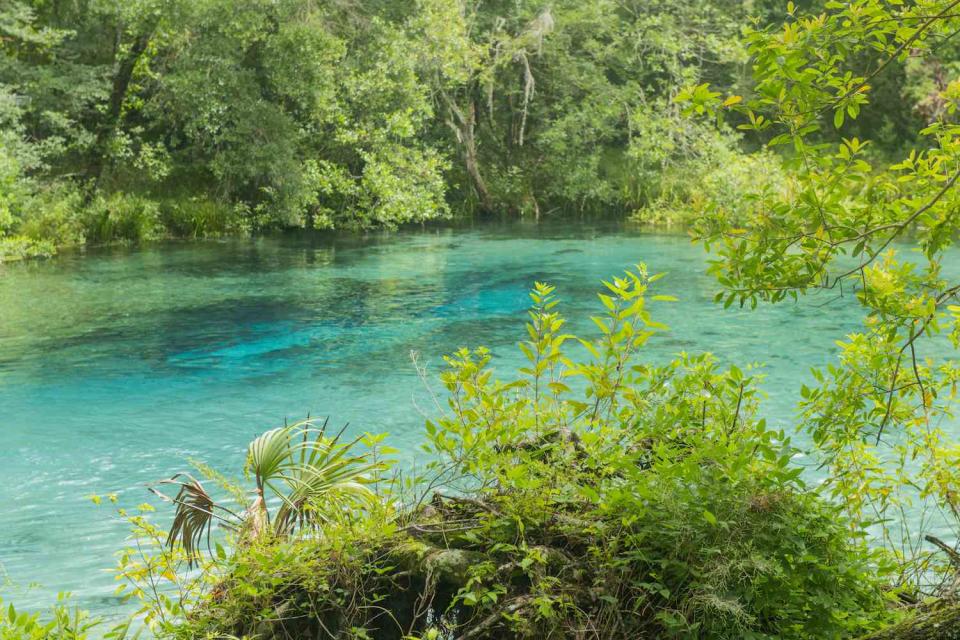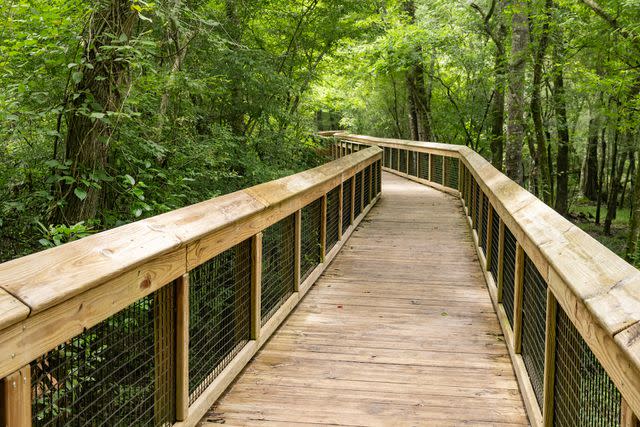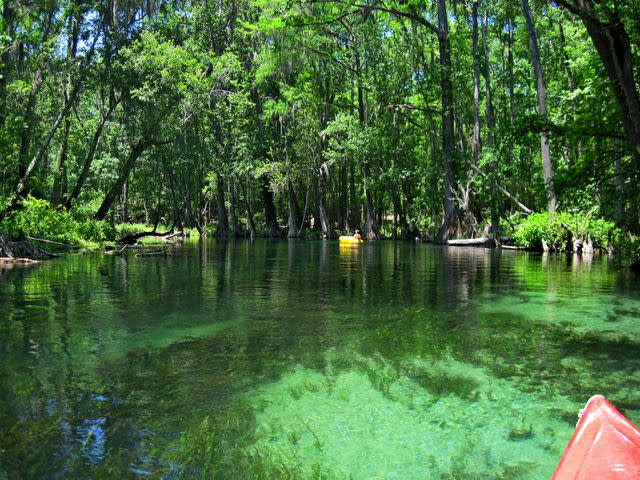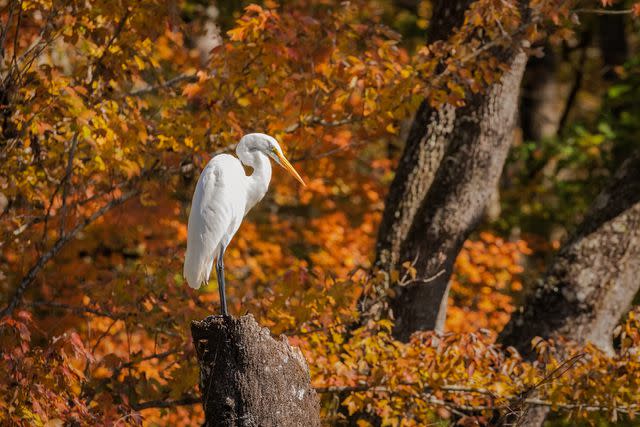The Complete Guide to Florida's Ichetucknee Springs State Park
This state park is a great place to experience the natural beauty of Florida.

Boogich / Getty Images
It’d be very, very easy to argue that Ichetucknee Springs State Park is the best state park in Florida. Thanks to the Ichetucknee River that winds through the park’s 2,241 acres, Ichetucknee Springs State Park is a well-known destination for shuttle-serviced river tubing, swimming in bright blue spring-fed swimming holes, snorkeling, viewing endangered wildlife like manatees, and even scuba diving, for visitors with dive experience.
Here’s everything to know about Ichetucknee Springs State Park, one of the best places to visit to experience the natural beauty and landscapes of the Sunshine State.
Transportation around Ichetucknee Springs State Park
Getting to Ichetucknee Springs State Park is easy, but you’ll need a car. The park is in northern Florida, roughly an hour north of Gainesville or 90 minutes west of Jacksonville. There’s no public transportation in the area, and rideshares are likely to be very expensive.
The park has two entrances: the South Entrance, where you’ll want to park for tubing and most river activities, and the North Entrance, which is closer to the Blue Hole (but has a smaller lot).
Once you’re in the park, you can probably ditch the car as the park runs both a shuttle service and a tram service. The tram service is for river tubers and runs between the South Takeout, the South Entrance, and the mid-river put-in points. The shuttle is for other watercraft, like kayaks and canoes. Tram and shuttle passes range from $7.50 to $12.50 per person and can be reserved online in advance.
When to go to Ichetucknee Springs State Park
The best time to visit Ichetucknee Springs State Park is between May and September. In the summer, daytime temperatures are reliably in the 80 degrees Fahrenheit, and the shallow river is at its warmest, making it the perfect time for tubing, swimming, paddling, and snorkeling. However, summer is also the busiest time in the park, and it can be hard to find parking or spot wildlife. Because of that, try to visit midweek (and be sure to reserve your activities and rentals in advance).
Winter is generally a very nice time for hiking and wildlife watching, and while most people would probably find it a little cool for tubing, it’s still an option. Tubing and shuttle service are available year-round, so you may have the river to yourself if you visit in February (but you may want a wetsuit).

Boogich / Getty Images
What to do in Ichetucknee Springs State Park
Ichetucknee Springs State Park is known throughout northern Florida for tubing, and people who live in the area will often make a float day at the park into an annual tradition. It’s something you shouldn’t miss, but it’s also not the only option at the park. You can hike, paddle, take ranger programs, or even go scuba diving.
Hiking
There are only three trails at the park, and they’re more of a gentle walk than an actual hike. Most people use the trails to look for wildlife, especially birds. The park is part of the Great Florida Bird Trail, and if birding is your thing, you’ll want to visit in the morning before the park gets crowded. The best birding trail is the longest in the park: the two-mile Pine Ridge Trail.
The other two trails in the park include the .4-mile Blue Hole Trail that connects the Blue Hole Spring with the north parking lot, and the Trestle Point Trail (a .75-mile loop). All trails start from the park’s North Entrance. Bring bug spray and use reef-safe sunscreen before heading out.
Tubing
Tubing (floating on an inner tube) down the park’s six miles of the Ichetucknee River is the main draw for most visitors. You can rent tubes in the park or bring your own, as long as it’s less than 60 inches and not filled with anything that could get into the river, like confetti or glitter.
There is a maximum number of people allowed on the river per day, so you should make your reservations in advance online at IchetuckneeSprings.com (the website for the park’s activity operator). Tube rentals cost anywhere from $7.50 to $30, depending on what type you want.
You can put your tube in the river at one of two locations: the Midpoint Launch, or Dampier’s Landing. From the Midpoint Launch, it’s a 45-minute float to Dampier’s Landing, then another hour of floating to reach the South Takeout Point. Regardless of your choice, you’ll need to buy a tram pass ($7.50) from the General Store at the South Entrance to ride the tram from the endpoint of the float back to the parking area. If you bring your own raft, your only cost will be the tram pass. However, you cannot make reservations online unless you rent from the park. So anyone bringing their own tubes will need to get their tickets upon arrival, making it a bit of a risk on summer weekends when the park may sell out of tube tickets.
No alcohol is allowed on the river, nor are single-use drink containers. However, you can bring water in a reusable bottle. While the river is generally slow and calm, you may want to connect the bottle to your raft or wrist to ensure you don’t lose it. It also helps to wear a water shoe with an ankle strap that'll stay on your feet, instead of flip-flops.

James Robert Smith / Getty Images
Kayaking and Paddling
If you'd like to be a bit more active, forgo tubing and do a longer paddle trip instead. Tubing services are limited to the lower half of the park, but if you rent kayaks, you start from the northernmost point of the Ichetucknee River.
You can rent kayaks, canoes, or stand-up paddleboards within the park, all reservable online. When making your reservation, you'll have to select what watercraft you'd like to rent (which range between $30 and $90 per day, depending on the trip) and what distance you'd like to paddle. Your choices are just two or three miles in the park, all six miles of the park's river as a point-to-point paddle, or a 9-mile paddle that extends beyond the park boundaries. When reserving your tickets, you'll be able to select any additional services you may need, like shuttle passes.
Whether you tube or paddle, you may be lucky enough to see wildlife like birds, alligators, turtles, or even manatees, especially between November and March.
Scuba Diving and Snorkeling
Most of the snorkeling in Florida is on the coast, but the park has two inland options for snorkeling and diving: Head Spring, and Blue Hole Spring. Both are near where the water emerges from the underground spring, so they're clean and clear. Bring your snorkel and mask as you can't rent them within the park. Most swimmers stick to the Head Springs as Blue Hole Springs is mostly for divers.
However, if you do want to dive, Blue Hole Spring has an extensive freshwater cave system that starts around 40 feet deep. You'll need to be cave or cavern certified and can rent tanks and gear from local shops like Cave Country Dive Shop or Extreme Exposure.
Lodging Near Ichetucknee Springs State Park
Ichetucknee Springs State Park is a bit remote, and unfortunately, there's no camping in the park. The hotel options will be at least 20 minutes away, but they're all relatively inexpensive, making visiting the park a budget-friendly addition to a northern Florida trip.
Camping
If you want to camp, your closest option is Ichetucknee Springs Campground, roughly .5 miles from the park's north entrance. It's privately owned and not affiliated with the park, but nearly everyone camping in the summer is there to float. It accommodates tents and RVs, and rates range from $23 to $45 a night. Reservations are made over the phone only.
The park does have covered picnic areas and public grills, so you can bring a cooler and food to cook on-site. You just can't sleep there.
Hotels
The park is in Fort White, a relatively small town that mostly serves as a place for park visitors to stock up on food and drinks before heading in. So if you're looking for hotels, you'll want to stay in the southern part of Lake City (about 25 miles from the park) or Alachua, about 30 minutes to the east. Alachua is a better bet if you're hoping also to explore Gainesville. Both places have budget hotel options like Fairfield Inns and Days Inns, usually available for under $100 per night.
If you want something much fancier than that, along the lines of a trendy Aloft hotel or full-service Hilton or Hyatt, you'll need to stay in Gainesville.

Konstantin Iagoudine / Getty Images
Accessibility
Ichetucknee Springs State Park is more accessible than you may expect. The shuttles and trams are handicapped accessible, as are all the restrooms and picnic areas. Additionally, there's a chair lift (like you'd find at a hotel pool) to help guests with mobility issues enter the Head Spring, and a cradle (to make kayaks and canoes stable during entry) on the boat launch at the North Entrance.
Service animals are allowed on all the trails; however, they are not allowed near any of the swimming areas or on the river, mostly due to threats from alligators.
Additional Tips
The park is buggy and mosquitos are common. Wear bug spray.
Some items are banned on the river, including food, coolers, speakers, and single-use products like plastic bags. Consider bringing a dry bag to hold anything you may need (like reef-safe sunscreen), along with a carabiner or other method for attaching it to your tube.
Admission fees are $6 per vehicle and are in addition to any activity fees (like tubing rentals)
All tram passes and rentals are managed at the General Store at the southern entrance. However, there is a sundry/souvenir store at the north entrance near the boat launch.
There are two dining options in the park: the General Store Grill at the South Entrance, and the Riverside Grill (summers only) at the North Entrance.
There are outdoor showers at the South Takeout Point.
The sun can be strong, so consider wearing a sun shirt or rash guard and sun-blocking hat while floating.
If you are lucky enough to see manatees, give them lots of space. They’re an endangered species and protected by several federal and state laws. Annoying or pursuing them is illegal, punishable by up to six months in jail. Rangers can and will issue fines. Rangers can and will issue fines.
A bit of personal advice: make sure you leave your car keys in a safe place, not in the pocket of someone’s swim trunks

